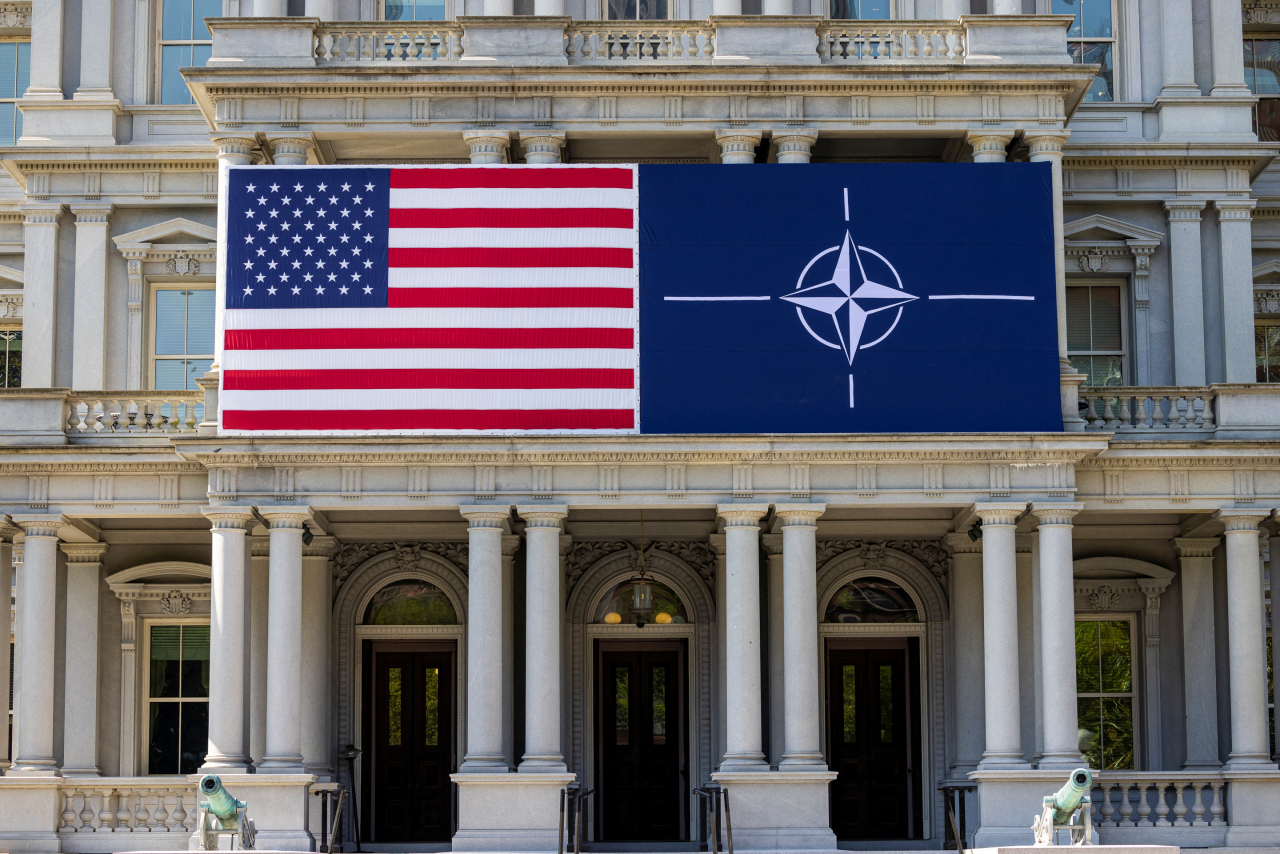 |
A view of the US flag alongside the NATO flag outside the Eisenhower Executive Office Building in Washington, US, Monday. (Reuters-Yonhap) |
The North Atlantic Treaty Organization is not expanding into the Indo-Pacific, but it has a "wide" opportunity for greater cooperation with South Korea and other regional partners, a senior US official said Monday.
Ambassador Michael Carpenter, senior advisor for Europe at the White House National Security Council, made the remarks as South Korean President Yoon Suk Yeol and the leaders of Japan, Australia and New Zealand have been invited to the NATO summit set to take place in Washington from Tuesday through Thursday.
The agenda for the forthcoming summit includes efforts to deepen NATO's partnership with the four Indo-Pacific partners, known as IP4 or IPP. This year marks the 75th founding anniversary of the 32-member transatlantic alliance.
"NATO and our Indo-Pacific partners have a lot of common interests and there is a wide opportunity for achieving better cooperation on a range of issues. I mentioned some of them, such as cybersecurity, fighting disinformation and building up our defense industrial bases," Carpenter said during the briefing at the Foreign Press Center.
"NATO is not expanding into the Indo-Pacific. There is no accession process. All of NATO's defense and deterrence capabilities are located in the Euro-Atlantic area on the territory of NATO allies," he added.
But the ambassador stressed the importance of security collaboration with IP4 countries.
"Obviously, our Indo-Pacific partners are incredibly important to all of our NATO allies," he said.
"It's an important region and the security of Europe impinges upon the security of the Indo-Pacific ... So this is an important time for us to be able to coordinate on such things as resilience, countering disinformation, defense industrial cooperation and a range of other things."
The ambassador called Russia a "primary" threat to NATO allies while voicing concerns over China's support to apparently aid Russia's war effort in Ukraine.
"The PRC has been directly providing support to Russia's defense industrial base across a range of dual-use items that have enabled not only the Russian military to target Ukraine ... but also that posed a longer-term threat to European security," he said. PRC stands for China's official name, the People's Republic of China.
"So that is something that is of immense concern to all NATO allies, but also is something of concern to our Indo-Pacific partners."
Cooperation between NATO and IP4 countries has taken on greater importance as Russia has been accused of deepening military cooperation with North Korea in an alignment feared to affect security in the Indo-Pacific as well as Europe.
The ambassador said that NATO is open to embracing more Indo-Pacific partners.
"Certainly, there are more partners that we have in the Indo-Pacific that are of great value to the NATO alliance," he said. "We will seek to include other partners in other events in the future. These are the leaders that are coming to this particular summit."
South Korea has deepened cooperation with NATO with the establishment of a diplomatic mission to NATO in November 2022 and other collaborative efforts amid North Korea's persistent military threats, China's growing assertiveness and other challenges. (Yonhap)







![[Today’s K-pop] Blackpink’s Jennie, Lisa invited to Coachella as solo acts](http://res.heraldm.com/phpwas/restmb_idxmake.php?idx=644&simg=/content/image/2024/11/21/20241121050099_0.jpg)